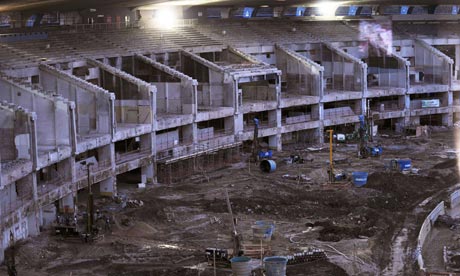Hundreds of Brazilian police and soldiers backed by helicopters and armoured vehicles swept in to take over a crime-ridden Rio slum yesterday as part of a pacification plan ahead of the football World Cup in 2014.
More than 100 marines, 160 elite police officers and 600 ordinary officers took part in the operation in the hillside Mangueira neighbourhood, which went off without a shot being fired, a police spokesman said.
Mangueira is near Rio's famed Maracana football stadium.
The pre-announced operation began just after dawn with 14 armoured personnel carriers thundering up the slum's steep roads and helicopters clattering overhead, as security forces on foot followed with arms at the ready.
Ninety minutes later, two of the vehicles reached the highest point of the slum and officers hoisted the Brazilian flag atop a water tank. The forces met no resistance. Drug gangs that had been controlling the district had fled well in advance.
"We were woken at six in the morning by the helicopters. Everything was already calm before that. It would have been better if they spent the money on improving the hospitals," said one resident, a kitchen employee and mother of five who gave her first name as Bete.
Her seven-year-old nephew Donatan said he was afraid: "When I heard the noise, my legs started shaking. The house was shaking, too. I thought the police were going to start shooting."
Most residents refused to comment for fear of reprisals in case the drug gangs returned. The few who did refused to give their last name.
"All of that is because of the World Cup. But afterwards, who will make sure it doesn't go back to like before, that the police won't leave?" asked Vera, 54.
Vinicius, 15, feared what the slum would be like under police control. "It's finished, going out at night. We'll have to stay at home."
Some residents said they were worried more about the police than the gang members, who reigned but also provided security. There were also concerns that gunfights might break out between police and drug traffickers.
The operation was the final link in a "security perimeter" authorities have set up around the Maracana stadium, which will play host to the World Cup final, to be watched by more than 700 million television viewers around the world.
It will also be a venue for sports featuring in the 2016 Olympic Games, which Rio will also host.
Unlike in previous years, when the police raided the neighbourhoods only to exit soon after, leaving a vacuum quickly filled by returning gangs, they are setting up local posts in the slums to maintain control.

